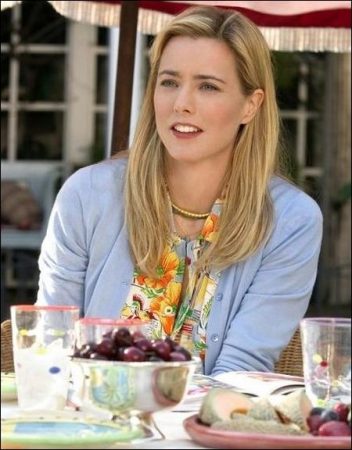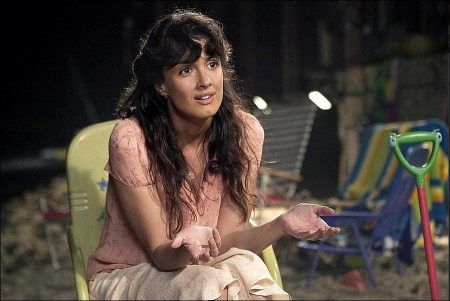Spanglish Movie Trailer. As far as Flor and “the lady of the house” are concerned, the culture clash is deep and vivid. Flor’s take on life is that continuity is key. Her idea of personal success is based on her child being able to say with pride and purpose, “I am my mother’s daughter.” Deborah, on the other hand, lives in fear of becoming anything like her mother, who was a wildly irresponsible parent during her formative years and has become, maddeningly, a perfect, loveable grandmother to her children.
At the beginning of the film, Flor, a native of Mexico is left with little money and few options as a single parent to her beloved six year-old daughter, Cristina. As Brooks explains, “Flor feels enormous guilt for having married a man who couldn’t properly be a parent and buries all her needs as a young woman to devote herself to her child. This devotion is neither a sacrifice nor martyrdom, but the most natural thing in the world to her.”
Seeking a better life for her daughter, Flor flees Mexico and settles in a Latino community in Los Angeles, which she never leaves. She effectively remains rooted in a world and language with which she is familiar and removed from American culture until the day she is hired as the Clasky’s housekeeper. As the narrator (Christina, six years after the close of the film) puts it, “After all her time in America, she finally enters a foreign land.”
John and Deborah Clasky (Adam Sandler and Téa Leoni) are having difficulty in their marriage. John is a loving, patient and steady father and husband as well as the chef and owner of an up and coming restaurant. Deborah has recently lost her job at a commercial design company and is now in the throes of an identity crisis. Her career had enabled her to channel some of her nervous energy. Without that outlet, her insecurities threaten the family’s stability.
As Brooks points out, “Deborah is going through a major early midlife-crisis (she’s in her late 30s), which is affecting everyone around her. A professional type-A successful woman, able to work hard (and be properly guilty about doing so), she loses her job and is thrust into being a full-time mom. A profound and enormously correct sense of her own inadequacy envelops her. She doesn’t have a mean bone in her body, but her desperation is sure doing some damage.”
Adds Leoni: “Deborah is almost completely self-absorbed, dangerously insecure and there isn’t anyone who hates her more than she hates herself… I guess that’s her most redeeming quality”. The comic potential for her character was a challenge for Leoni. “Deborah is so close to being a good mother, a good wife, a good person…she is almost intelligent, almost appropriate, almost understanding, and almost has a sense of humor, but not quite. Once I had figured out that it was a matter of ‘almost,’ she became a more sympathetic character and her actions became forgivable and funny.”
When Deborah goes shopping and returns with clothes that are a size too small for her daughter. “Deborah truly believes that what she’s doing is loving, protecting and supporting her daughter,” says Leoni. “Although her methods are somewhat foul, I never doubted her love for Bernie or her concern for Bernie’s well being. Jim wrote a perfectly twisted, sincere character.”
Well-intentioned, but high-strung and unconsciously nutty, Deborah is always striving for self-worth and it is constantly eluding her. Her two children, Bernice and Georgie (Sarah Steele and Ian Hyland), fall victim to Deborah’s idealized vision of how they should be. Deborah’s mother, Evelyn (Cloris Leachman), is painfully aware of her daughter’s internal chaos and its consequences — but her warnings fall on deaf ears. Evelyn is a former moderately successful jazz singer who deals with her current situation, living in the house under the constant disapproval of her daughter, by being a dedicated and amiable drunk. “At a certain point, Evelyn’s the one who sees everything coming,” says Brooks. “She gets what’s happening before the participants do. She has a line where she says to Flor: ‘I love you. I love all of us. That’s what’s killing me.’”
Flor finds Deborah’s well-meaning, frenzied demeanor overbearing and strange. Sheltered by her inability to speak English, she quietly observes her employer’s behavior from a safe distance. “Privacy and dignity are the same thing as far as Flor is concerned,” explains Brooks. “She keeps her life separate and private from the Claskys. She doesn’t even tell them she has a daughter until she’s forced to reveal it.”
Inevitably, however, Flor is drawn into the family members’ lives. In a not-so-subtle effort to encourage Bernice to lose weight, Deborah buys her daughter clothes a size too small. Bernice is devastated. Flor surrenders her remove and comes to Bernice’s aid. She alters the clothes to fit her and, in doing so, loses her last line of defense.
At the same time, a prominent newspaper gives John’s restaurant a four star rating, dubbing him “the best chef in America.” His reaction is ambivalent because he had worked for a restaurant in New York that received four stars and, as he says, “It was like a line formed to become an asshole. People’s accents changed.” He is convinced that three and a quarter stars would be perfect: “You get enough respect so good people will still work with you. Business is good, not crazy. You’re right there underneath the radar where you get to mind your own business. That’s a solid life.”
The Claskys rent a summer beach house in Malibu that is unreachable by bus. Deborah assumes Flor will move in for the summer. Flor refuses and surrendering her privacy, tells the family for the first time that she has a daughter. Deborah says they can both live in. If she doesn’t move, she will lose her job. It’s a Hobson’s choice. Flor moves in. Deborah is immediately taken with Cristina and takes the impressionable young girl under her wing. As Brooks notes, “Cristina is a golden child. She’s brilliant, beautiful and wowed by Deborah. A competition for the character and soul of the child develops between the two women.”
Also, as Deborah’s behavior becomes increasingly more inappropriate, Flor and John become each other’s touchstones and the seeds for a mutual attraction are sown. “What Flor and John have in common is their love for their children,” says Sandler. “They are just looking to make everybody happy.”
Brooks adds, “John is as devoted a parent as Flor. He demonstrates enormous goodwill and optimism as he tries to be both mother and father to his children as Deborah becomes dangerously self-involved. Although separated by language (at times Cristina hilariously serves as interpreter between the two), Flor and John find a great deal of common ground in their unwavering and sincere commitment to their children.
“Decency can be sexy,” quips Brooks. “And that’s exactly what happens between these two characters. Their openness and decency stun each other in the way a low-cut dress or hunky looks usually stuns people in the movies. They are literally knocked out by each other’s goodness.”
The inherent difficulties of communication and the shortcomings of language plague every relationship in Spanglish. Executive producer Christy Haubegger contends, “There are language issues everywhere in this film – between John and Deborah, Deborah and Flor, Flor and Cristina, John and Flor, etc. The word ‘Spanglish’ is a metaphor for the collision of cultures within this household. It’s also a metaphor for the overall inadequacy of language. To some extent, whether or not we speak the same language, we’re always interpreting one another’s behavior.”
While John and Flor have problems communicating through language, they show an instinctual understanding of each other’s behavior and true empathy and compassion for each other’s feelings. “Cultural differences in our melting pot society can be profound,” says Brooks. “But with Flor and John, it’s the similarities that are profound.”
Leoni echoes that sentiment, adding, “Cultures coming together, clashing together, is certainly one aspect of this film. But I think what Jim is playing on is our inability to communicate, understand or even hear the people in our lives who are closest to us.”
Spanglish (2004)
Directed by: James L. Brooks
Starring: Adam Sandler, Téa Leoni, Paz Vega, Cloris Leachman, Ian Hyland, Shelbie Bruce, Sarah Steele, Victoria Luna, Cecilia Suárez, Ricardo Molina, Brenda Canela
Screenplay by: Patrick Marber
Production Design by: Ida Random
Cinematography by: John Seale
Film Editing by: Richard Marks, Tia Nolan
Costume Design by: Shay Cunliffe, Louise Mingenbach
Set Decoration by: Leslie Pope
Art Direction by: Tom Reta
Music by: Hans Zimmer
MPAA Rating: PG-13 some sexual content and brief language.
Distributed by: Columbia Pictures
Release Date: December 17, 2004
Views: 215







